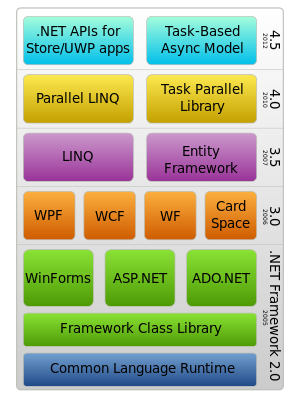.Net Framework
 |
|

.NET Framework component stack
|
|
| Developer(s) | Microsoft |
|---|---|
| Initial release | 13 February 2002 |
| Stable release |
4.6.2 / 2 August 2016
|
| Operating system | Windows 98 or later, Windows NT 4.0 or later |
| Type | Software framework |
| License | Mixed; see § Licensing |
| Website | microsoft |
.NET Framework (pronounced dot net) is a software framework developed by Microsoft that runs primarily on Microsoft Windows. It includes a large class library known as Framework Class Library (FCL) and provides language interoperability (each language can use code written in other languages) across several programming languages. Programs written for .NET Framework execute in a software environment (in contrast to a hardware environment) known as Common Language Runtime (CLR), an application virtual machine that provides services such as security, memory management, and exception handling. (As such, computer code written using .NET Framework is called "managed code".) FCL and CLR together constitute .NET Framework.
FCL provides user interface, data access, database connectivity, cryptography, web application development, numeric algorithms, and network communications. Programmers produce software by combining their own source code with .NET Framework and other libraries. .NET Framework is intended to be used by most new applications created for the Windows platform. Microsoft also produces an integrated development environment largely for .NET software called Visual Studio.
...
Wikipedia
